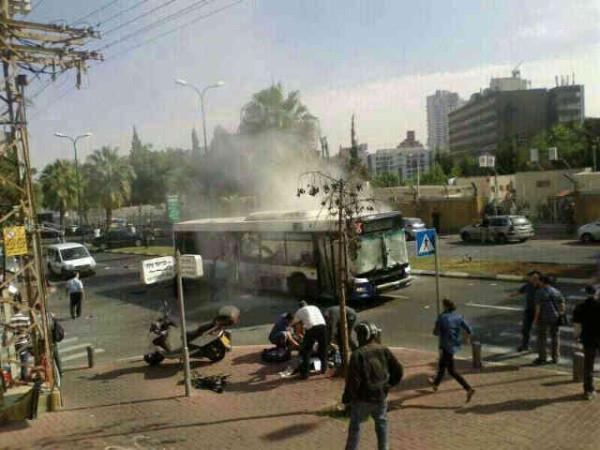
A bus just exploded in Tel Aviv, less than four miles away from where I sit right now, typing this article. Up until now, the current situation has felt more than a bit surreal. Sure, I’ve heard the “tzeva adom” sirens go off, and I’ve spent time sitting in our apartment’s “safe room,” but at the same time, I have been operating under the assumption that I will receive some sort of a warning before crisis hits, that a siren will go off and that there will be a set of precautions that I can take in order to ensure my continued safety. Suicide bombings have now changed the “rules of the game.”
When a bomb is detonated on a bus, or in a public place, we are given no advance warning. There is no time to run and hide in a safe room, no time to slam the door to a bomb shelter. There is absolutely nothing that anyone in the vicinity of a bomb can do to protect his or herself.
This suicide bombing happened just a day after U.S. Secretary of State, Hilary Clinton, arrived in Israel, calling for de-escalation in violence, in an attempt to hold off a potential Israeli ground invasion of the Gaza Strip.
In effect, the United States is promoting the idea of Israeli negotiations with Hamas – an organization which has been classified as a terrorist organization by the United States State Department. US foreign policy clearly states that the United States of America “does not negotiate with terrorists.” Hamas is a terrorist organization. Why, then, is the United States going against its own policies and advocating for negotiations with a terrorist entity?
If the current situation were taking place in the US, the rest of the world would completely back the United States as it tried to neutralize the threat, and restore peace to its territory.
Many political scholars are of the opinion that the difference between a “strong” state and a “weak” state is the ability of the state to adequately protect its civilians. In other words, one of the primary criterion for the classification of a state as a “strong” state is that nations national security capabilities.
Israel is in a situation unlike that faced by any other country and the Israeli government is doing whatever it can to ensure the survival of its people. If it is decided that a ground operation is the best way to neutralize the threat presented by Hamas, in Gaza, it is Israel’s prerogative to make that call.
The United States national anthem, The Star Spangled Banner, was written as a response to the US’s survival of England’s attack on Fort McHenry, during the War of 1812. The second part of the first stanza references
“… the rockets’ red glare, the bombs bursting in air,
gave proof through the night that our flag was still there”
These lines use the continued presence of the flag as a symbol of the states’ continued survival, despite the enemy’s attempts to destroy them and all that they stand for.
Today, when I look outside my window and see the Israeli flag waving, I am reminded of the fact that Israel is still a thriving and functioning state, despite the others’ numerous attempts to destroy it and all that it stands for.
The term “freedom” does not only refer to freedom in the traditional sense, but also to the freedoms that most citizens of the world take for granted; freedom from falling rockets, freedom from bomb threats and freedom from the other forms of terror that currently threaten day-to-day life. The Israeli government should take any and every step that it feels necessary, in order to ensure that Israel, like the U.S., remains “the land of the free and the home of the brave.”

